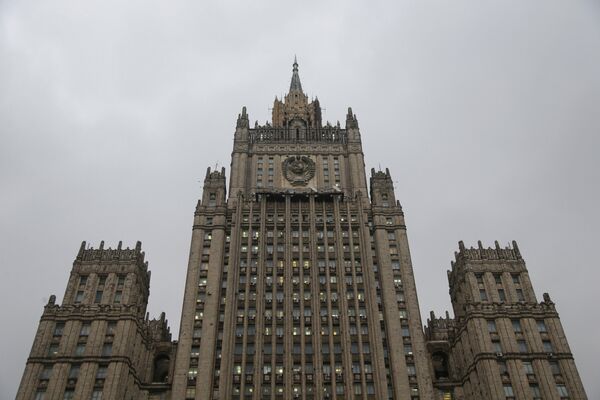MOSCOW, April 1 (RIA Novosti) - Ukraine's loss of territorial integrity was a result of internal processes, not interference from Russia, which never violated its obligations under a 1994 agreement on respecting Ukrainian borders, the Russian Foreign Ministry said Tuesday.
"The current Kiev 'government,' which came to power in the wake of an unconstitutional coup, carried out policies, especially in relation to ethnic minorities, that in essence undermined Ukraine's unity and pushed a whole region out of the country," the ministry said in a statement.
"Russia is strictly following its obligations under the 1994 Budapest Memorandum on respecting Ukraine's sovereignty, including during several months of internal political standoff in Kiev," the statement said.
"The same cannot be applied to the policies conducted by Western countries, which blatantly ignored this sovereignty during the events on Maidan," it said.
Under the 1994 Budapest Memorandum, Ukraine gave up its Soviet nuclear arsenal - the world's third largest at the time - in exchange for international guarantees that its territorial integrity and political independence would be respected.
The ministry said that during the summit of the Organization for Security and Cooperation in Europe (OSCE) in Budapest in 1994, Russia "stopped short of making any commitments to force a region of Ukraine to remain a part of Ukraine against the will of the local population."
"Provisions of the Budapest memorandum do not apply to events caused by internal political or social factors," the ministry said.
"Russia, the United Kingdom and Ukraine adopted a joint statement in Budapest, which, among other things, underlined the importance of Ukraine's obligations within the OSCE framework to counteract aggressive nationalism and chauvinism. It's quite evident that the Ukrainian side failed to fulfill these commitments ... which eventually led to Crimea's self-determination to be a part of Russia," it continued.
Calls for secession have been spreading across the country's mainly Russian-speaking southeastern regions after Ukrainian ultranationalists, who make up the bulk of the erstwhile opposition, rose to political prominence amid a violent anti-government uprising in February.
Talk turned to action in Crimea, a predominantly Russian-ethnic peninsula, which voted overwhelmingly to rejoin Russia in a referendum on March 16. The region's reunification with Russia was finalized several days later.


